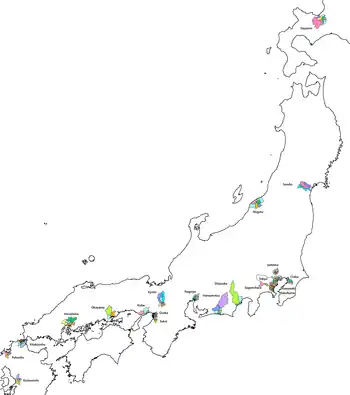Wards of Japan
A ward (区, ku) is a subdivision of the cities of Japan that are large enough to have been designated by government ordinance.[1] Wards are used to subdivide each city designated by government ordinance ("designated city"). The 23 special wards of Tokyo Metropolis have a municipal status, and are not the same as other entities referred to as ku, although their predecessors were.
 Japanese cities subdivided into wards.
| ||||||||||
|
Wards are local entities directly controlled by the municipal government. They handle administrative functions such as koseki registration, health insurance, and property taxation. Many wards have affiliated residents' organizations for a number of tasks, although these do not have any legal authority.
List of wards
Special wards of Tokyo
The special wards of Tokyo are not normal wards in the usual sense of the term, but instead an administrative unit governed similar to cities.
| Ward | Japanese | Metropolis | Area (km2) |
|---|---|---|---|
| Adachi | 足立区 | Tokyo | 53.25 |
| Arakawa | 荒川区 | Tokyo | 10.16 |
| Bunkyō | 文京区 | Tokyo | 11.29 |
| Chiyoda | 千代田区 | Tokyo | 11.66 |
| Chūō | 中央区 | Tokyo | 10.21 |
| Edogawa | 江戸川区 | Tokyo | 49.90 |
| Itabashi | 板橋区 | Tokyo | 32.22 |
| Katsushika | 葛飾区 | Tokyo | 34.80 |
| Kita | 北区 | Tokyo | 20.61 |
| Kōtō | 江東区 | Tokyo | 40.16 |
| Meguro | 目黒区 | Tokyo | 14.67 |
| Minato | 港区 | Tokyo | 20.37 |
| Nakano | 中野区 | Tokyo | 15.59 |
| Nerima | 練馬区 | Tokyo | 48.08 |
| Ōta | 大田区 | Tokyo | 60.66 |
| Setagaya | 世田谷区 | Tokyo | 58.05 |
| Shibuya | 渋谷区 | Tokyo | 15.11 |
| Shinagawa | 品川区 | Tokyo | 22.84 |
| Shinjuku | 新宿区 | Tokyo | 18.22 |
| Suginami | 杉並区 | Tokyo | 34.06 |
| Sumida | 墨田区 | Tokyo | 13.77 |
| Toshima | 豊島区 | Tokyo | 13.01 |
| Taitō | 台東区 | Tokyo | 10.11 |
See also
- District (China), the original use of the ku kanji, still in use in China and Taiwan
- Administrative districts of South Korea, also pronounced gu
References
- “Statistical Handbook of Japan 2008” by Statistics Bureau, Japan Archived 2013-02-07 at the Wayback Machine Chapter 17: Government System (Retrieved on July 4, 2009)